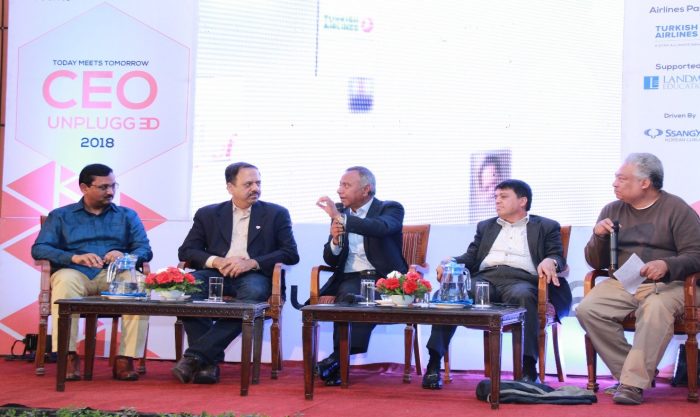This second panel discussion of CEO Unplugged 2018 organized by Glocal Pvt. Ltd. was Business Adaptation – Changing Nepal. The panel was to discuss in the certainty and predictability ruled in the country through the insight of Boomers Leaders tapping the economic development change in Nepal. Discussing on the major bottleneck for Nepal to achieve higher levels of economic growth.
CEO Unplugged is a yearly forum organized by Glocal Pvt. Ltd. comprising series of panel discussion where we try to establish a forum to discuss about contemporary business challenges, opportunities and futuristic view with a sight of experiential learning to the new comers in the business and students with an objective “Today Meets Tomorrow“.
The panel discussion comprised of panelist; Chandra Dhakal, Chairman of IME Group, Joseph Silvanus, CEO at Standard Chartered Bank Nepal, Puneet Varshney, MD at Bottler’s Nepal, Dr. Upendra Mahato, Founder of Mahato Group of Industries and moderator; Anil Chitrakar, President at Siddhartnic.
In his opening remark, Chitrakar mentioned, “It is not an irony when you generally say Nepalese are comfortable with change, but then businesses is about change. But when you talk about change to people who inherently seek comfort it is not an easy thing to understand. How many of you believe that most of the products/opportunities that you see today is because something changed? And how many of you think we don’t need to change certain things, like learning English? Now, this is very important to understand that businesses are created because there is change.”
Chitrakar opined that the discussion of the panel could bring the best out of how the audience could take advantages of certain changes to start the businesses but which changes are completely not necessary in a business. He asked these veteran entrepreneurs on how do they want young people to think about change, how do they adapt to change, their plans on initiating change in the enterprise, turn their failures into lessons, resistance to changes and preparation of change that leads them ahead of their time.
Jospeh Silvanus, CEO at Standard Chartered Bank Nepal
“Change is a constant. Even in my organization people who get their comfort zone, there’s no place for them. When the rate of change of an organization internally is slower than the environmental change, the organization loses in the short time. So, we have got to change faster than the environment itself.
For financial intermediate space- fresh axioms and no surprises. You have to manage surprises and you got to be ahead of curve. For us, a client stays longer who has more products and gives us more revenue and the question is- How do I keep a client engaged over an entire lifecycle of his banking with us?
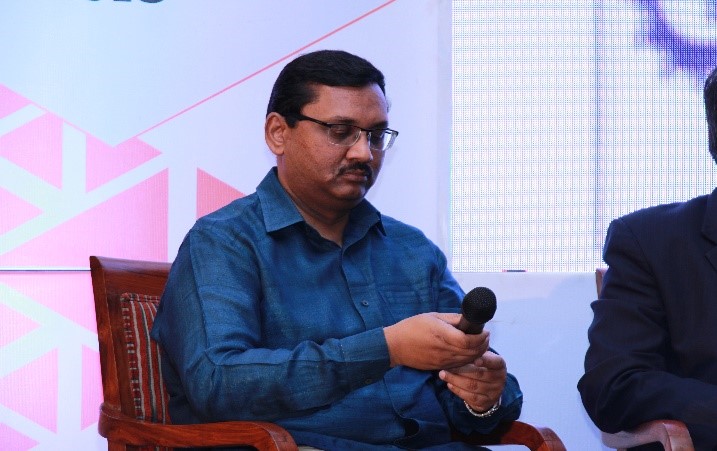
I employ young people who are aspirational. The longer you stay with me, you will learn and grow with the organization as well as the corporate culture. You will be handling all our clients and you will be the ambassador of the entire bank. Therefore, people power is inside us. If I invest in you and you grow in your career, you will handle my clients. This is the simple truth for me to stay ahead of the game.
Today between banks and institutions and financial intermediation space there’s no difference in the products we offer. The differentiation is the brand and people who manage the brand with style, consistency and every moment with customer care delight.
I think there is no harm in failing as long as you learn from it. For us this is important that you realize that there is difference between creating a wage and salary and wealth creation. So, this is where I am going into the core area of my finance. This country needs wealth creation and it needs wealth creation in all your hands. It’s different from earning a salary because your propensity to spend is 92 cents according to the facts and statistics of the country’s economy.
How do you save? You have got to change your behavior. You have to think about tomorrow. If you end up spending what you get today and tomorrow in the country having sales and investments rate of 7 percent, what does it offer to the country’s capital formation in a medium and long term?
So, for me it’s very important for me to see that my staffs are savers. Then I can portray to the larger public and you people here about saving being very important.”
Puneet Varshney, MD at Bottler’s Nepal
“Change is something that has been spoken till death like, change is constant and one should change within time. This has evoked a lot of theories, lot of good thought and debate as well as a lot of funny jokes around what change is all about. I think it is important for every organization and especially for organizations like ours.
We manage the biggest brand in the world, i.e. Coca- Cola and for a brand to stay contemporary and still be rooted in a manufacturing process is especially tricky. The most challenging aspect of the job is that the world will change, whether you like it or not and if you can change in line with the world is when you stay relevant.
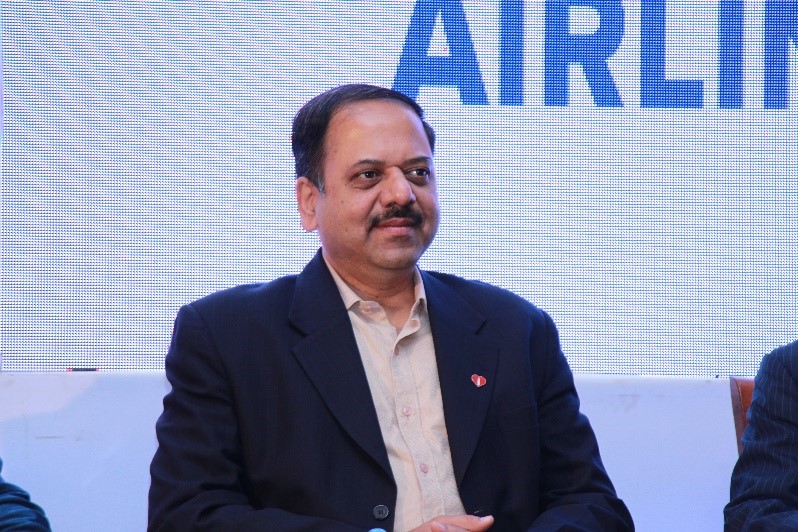
One has to understand that there will always be failures. There is no environment, there is no business situation or there is no personal life situation for that pattern where there won’t be failure. So, there is going to be failure in everything you do. The question is what you learn from that. Every failure adds to experience for sure. For us as a company or as a business, we like to stay focused on a consumer than a customer. We spend a lot of time and energy going through our consumers. So, we believe if we can get that right, the rest of it can be structured. So, if the consumers are changing either because of technology or what they believe in then our enterprise changes and follow it quickly.
Often people take entrepreneurship as different from corporate life. The biggest challenge for corporates is how we get our associates to think as entrepreneurs. It is a concept which is not devoid of each other. It is not a family structure vs. a corporate structure or a non-entrepreneur vs. an entrepreneur. Every person to succeed in business must have a spirit of entrepreneurship. It means if a corporate structure can actually challenge that spirit in a manner that gives you the best chance of success, then that’s where you are able to make it to the best.
Every corporate will probably laugh to know when the employee will think like an entrepreneur because what entrepreneurship means is change. What entrepreneurship means is the ability to predict what will happen and ability to understand how that will impact your own business products and services and how to make money in that. Therefore, if you are able to understand what’s happening, channel the process and make money out of that process then you will be successful.
One must understand a fact that the people who generally are at senior levels in any organization or in society in general, there is something that has given them success and that success has let them to the top of the organizational structure. It is difficult for those seniors to believe that what they have got them to the success will lead them to success in the next ten years. So, whatever I have learnt in these 10 years is not necessarily the company needs to be in the next ten years. Therefore, building organization is a change. This something that doesn’t come naturally to you and so does that happen to every other person in the company. Nobody likes change because you are always comfortable and confident in what you know. So, that is what brings you to the important value culture of the organization culture, i.e. are we able to encourage people do new things differently and make them safe in the belief that it’s okay.
The best organizations I hear about or I have worked with have always said that, “Look its okay to do things that are different.” In fact these enterprises would reward you for doing that. These ideas are not just radical or random. It is a well-known in marketing circles, when you start a new business idea, you can’t go to a consumer or a customer and ask that customer what do they want. You can’t go to somebody and say, “What should I give you?” because consumers don’t know in advance what they need. But when you present them with an idea they can’t say what they like or not. So, you have to understand what the customer is saying, take that, have an internal process to build ways to adjust those customer’s needs. Get your team to have that mindset. This is not just applicable in any product launch, be it area of business operation or while dealing with vendors.
Every year new theories come in a business, but vandalizing principles always remain the same, i.e. let’s look at doing better tomorrow than what we’re doing today. It is always the overlook at the small steps that bring development.
To the youths of tomorrow, often we get where Nepal is and what we’re doing right and what we’re not doing right. There’s enough problem around us which makes us think, “Hey! Where are we going? And What will happen?” I hear a lot of people saying, “My future is outside Nepal or when I finish this course I am going outside.” The point is you have to create opportunity in Nepal. So, there is a lot of opportunity here because here we don’t need to go through the cycles as developed countries went through. We have the advantage of a leapfrogging technology. In technology we are not behind the world.
You must have read how Nepal is planning to put its own satellite and therefore those are things which fire the imagination and convinces others that we are among the best. That’s something we must never forget-never ever!”
Dr. Upendra Mahato, Founder at Mahato Group of Industries
About the change, everybody is changing. Change is related to everybody, in everything and in every sense. So, change makes us grow. When you are confident that there is change and change is in your mind, you will be changed.
I am overwhelmed to witness such enthusiastic mass of young generation. When we talk about change there comes innovation. Innovation is local and product is global. Most of these innovations commence through the developing countries because in the search of opportunity to do something our minds have learnt to sharpen themselves. But this innovation must have a continuity and for this we need to establish some cultures.
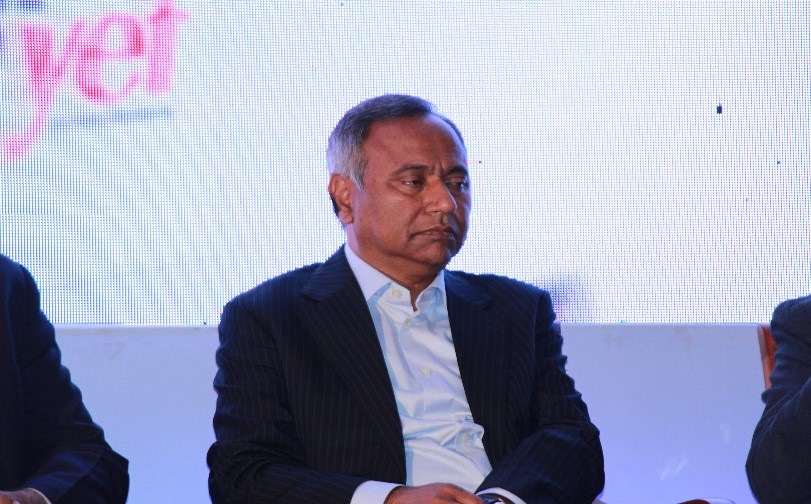
For instance, in Nepal there’s a system of ‘Once you hire a person you can’t fire him/her’. This is the biggest problem of Nepal. If we want to fire someone from the job, then we must go to different channels to plead. But if the employee wants to leave, he/she can leave the job in a second. If we really want to develop the country we need to eradicate this culture.
Take risk. Entrepreneurship whether minimal or extensive, is about taking risk. You can initiate you own enterprise. The more society has people of small and medium background, the more it is stable. You are the generation who can make this stability happen. The government will provide you with 40-50 percent employment, the rest percent of employment you have to create yourself.
If anyone knew how to put the business in a right track, then most successful entrepreneurs would be professors of Harvard and Oxford University. They have been teaching all their lives about how to become prosperous, how to manage the business. But, you the one who learns it and applies it pragmatically becomes more successful than them.
Nepal provides opportunities as one can invest in many enterprises. Statistics is a relative thing but your thought is always a constant. What you are thinking you should continue that. If you want to be successful in life, you should act with honesty and labor.
Culture should be changed by evolution and economy should also be changed by evolution. When you are thinking about something and planning to do something, think and plan by closing your eyes and do your work by opening your eyes. That is your change.
In life, change happens by some incident or situation. This incident invites new changes and thinking in the life of the individual. I would like to give an insight of an example of my life. If I had the ability to treat people through the money I had, my mother would be with me today. If that night, my mother had got an access to a doctor, she could have been with me today. From that day I realized, Nepal needs a health service that didn’t let anyone’s family die untimely in the lack of treatment. Even though I am not a medical doctor, I felt like doing something in the medical sector of the country.
Many people told me to initiate hotel and housing business as they seem to bring easy money. But I chose to do something in medical sector. What I have experienced is that Nepal is the only place in the world where people have a full-fledged service oriented heart. So why not Nepalese do something in the field of service-oriented fields like education, health, agriculture and tourism?
Today’s world depends upon three things- networking, branding and perception. So, if you want to change with time by taking these three things you will surely develop.
Chandra Dhakal, Chairman of IME Group
In my opinion, in accordance to time everyone should learn to change. If people don’t change in accordance to the time, definitely the result will not be produced as in the thought process.
Whenever I plan to work, I look up to three major things. Firstly, the project should look up to solve the problem of public. Similarly, the project should be initiated in accordance to the motive of the government as well and finally the product you will to give should fulfill the motive of your enterprise.
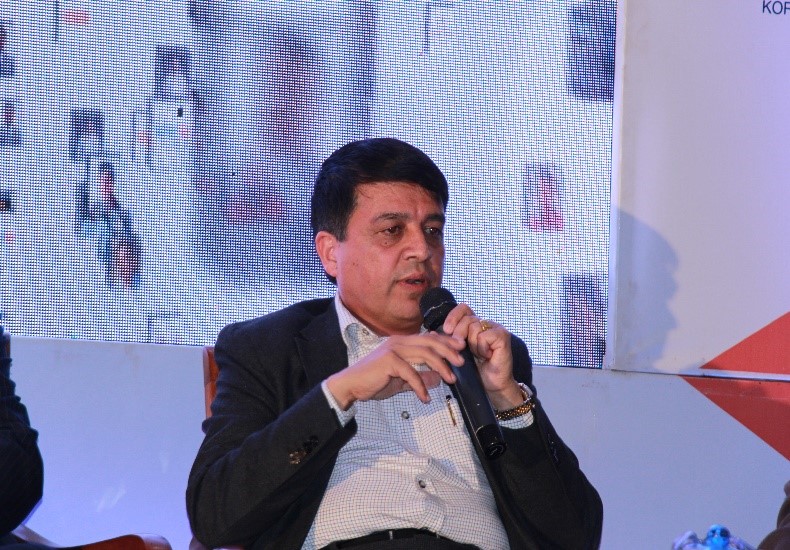
I would like to give my example on the basis of the above three things I mentioned. 18 years ago, the trend of Nepalese going abroad was raging. In this conflict period, the government was in an ardent need of a formal channel that could invite the foreign currencies to the country. So, we commenced the beginning of IME as a remittance enterprise. Similar is the idea behind the establishment of Chandragiri Hills. The ongoing pollution in Kathmandu is unbearable and in such situation people long for a place that presents them with the beauty of nature. So, we brought the idea of Chandragiri Hills. This profited the government as the government was in works to instigate a project related to tourism. As an entrepreneur I have fulfilled the necessities of the plan to work.
As I mentioned earlier, we should learn to transform according to time. Transforming the traditional and conventional work pattern may be difficult. But, every one of you must look at the broad vision of the work that is set to be initiated. A level of patience should be inherent and a lot of effort is required. Even if you initiate an enterprise it should profit the government’s goals.
Conclusion
Citing example of a parable of inspiring story of change of Budhha and his disciple Chitrakar concluded the event. Chitrakar’s sole method of asserting examples and asking questions to the entrepreneurs was a spark of his technique to inspire the audience. The second panel gave the event with knowledge, expertise and the strength to the aspiring entrepreneurs of the country.

